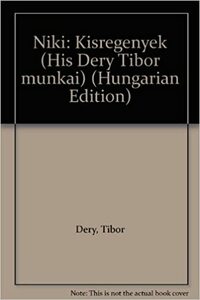Take a photo of a barcode or cover
Egy kisregény, ami egy kutya életén keresztül mutatja be az emberek életét is. A korról, politikáról nem annyira tudok, azt nem éreztem át, viszont az, ahogy a szegény kutya a vidékről a városba költözve elveszíti a szabadságát, az megérintett.
Ahogy Nikit emberi nőkhöz hasonlítja - és ahogy így a kutyáról és a nőkről is ír - az néha eléggé kellemetlen, de egyébként tetszett a stílus és hogy igazán kidolgozta Niki érzelmeit.
Ahogy Nikit emberi nőkhöz hasonlítja - és ahogy így a kutyáról és a nőkről is ír - az néha eléggé kellemetlen, de egyébként tetszett a stílus és hogy igazán kidolgozta Niki érzelmeit.
hopeful
reflective
sad
slow-paced
Plot or Character Driven:
Character
Strong character development:
No
Loveable characters:
No
Diverse cast of characters:
Yes
Flaws of characters a main focus:
No
It was an alright book. It was a bit boring for my tastes, as I usually prefer adventure. The ending is just sad, and it makes you feel down. I understand it was usual in its time, but it also annoys me how often they use the word “bitch.” Just say dog, it sounds better. It was an okay read, but I probably won’t pick it up again.
Graphic: Animal cruelty, Animal death
Moderate: Pregnancy, War
Minor: Racism
reflective
slow-paced
Plot or Character Driven:
Character
Strong character development:
No
Loveable characters:
Yes
Diverse cast of characters:
Yes
Flaws of characters a main focus:
Complicated
What an incredible look into what the world felt like for those under the oppressive regime of Stalin's Hungary. I'm still in shock this made it past the censors, but the storytelling, while clinical, made sense given the time and the characters involved.
I don't want to spoil the story, but reading the heavy heartache and pain is something that reminded me deeply of how my Grandma, Great-Uncle, and Uncle felt about that time. But also, there was a continued sense of hope and desire to keep going, even when it doesn't feel worth it.
I don't want to spoil the story, but reading the heavy heartache and pain is something that reminded me deeply of how my Grandma, Great-Uncle, and Uncle felt about that time. But also, there was a continued sense of hope and desire to keep going, even when it doesn't feel worth it.
sad
fast-paced
Plot or Character Driven:
Character
Strong character development:
No
Loveable characters:
Yes
Diverse cast of characters:
No
Flaws of characters a main focus:
No
Empecé este libro en el colectivo, lo leí en mis viajes diarios en colectivo (no todos esos viajes leí :B ), y lo terminé en un colectivo, y me costó un poco intentar no lagrimear sentada en un asiento de la última fila, de un bondi lleno, con los últimos párrafos.
La historia me aplastó de ternura, con las descripciones de la perra, sus actitudes, cómo se veía, y la relación con sus dueños. Hay varias frases sutilmente mezcladas en medio del relato que son muy buenas, así como también una constante descripción de "lo femenino" (suave, dulce, ordenado) bastante molesta. Por otro lado, el relato recordaba siempre que todo lo descrito eran posibles análisis, y dudaba muchas veces de la inteligencia de la perra, y cuando daba una posible interpretación demasiado profunda de lo que la perra pensaba/sentía, no dejaba de aclarar que "quién sabe, idiotas como pueden ser estos bichos", lo cual me parecía innecesario... El "chiste" era dejarse llevar por el posible pensamiento humano dentro del cerebro perruno (que sabemos que no es necesariamente así), pero sobre-aclarando que eran invenciones creativas le quitaba esa magia de interpretar la mirada de tu mascota... Además, luego en otros párrafos describía su inteligencia, y se maravillaba ante sus actitudes.
Creí haber marcado una frase donde se plasmaba muy bien la sensación de observador de segundo plano del relator, pero no la encuentro. Encontré "este último detalle nos sirve más bien para resumir las impresiones de la señora Ancsa que para expresar nuestra opinión, que siempre nos callamos...".
"... ocurre a veces que los hombres del Estado experimentados e inteligentes imponen al pueblo cosas que no aceptarían de buen grado para ellos mismos, como por ejemplo los apartamentos compartidos entre varias familias, (...) la integridad moral..."
En conclusión, a pesar de la aclaración repetida sobre el desapego "interpretativo", me pareció un retrato muy interesante.
La historia me aplastó de ternura, con las descripciones de la perra, sus actitudes, cómo se veía, y la relación con sus dueños. Hay varias frases sutilmente mezcladas en medio del relato que son muy buenas, así como también una constante descripción de "lo femenino" (suave, dulce, ordenado) bastante molesta. Por otro lado, el relato recordaba siempre que todo lo descrito eran posibles análisis, y dudaba muchas veces de la inteligencia de la perra, y cuando daba una posible interpretación demasiado profunda de lo que la perra pensaba/sentía, no dejaba de aclarar que "quién sabe, idiotas como pueden ser estos bichos", lo cual me parecía innecesario... El "chiste" era dejarse llevar por el posible pensamiento humano dentro del cerebro perruno (que sabemos que no es necesariamente así), pero sobre-aclarando que eran invenciones creativas le quitaba esa magia de interpretar la mirada de tu mascota... Además, luego en otros párrafos describía su inteligencia, y se maravillaba ante sus actitudes.
Creí haber marcado una frase donde se plasmaba muy bien la sensación de observador de segundo plano del relator, pero no la encuentro. Encontré "este último detalle nos sirve más bien para resumir las impresiones de la señora Ancsa que para expresar nuestra opinión, que siempre nos callamos...".
"... ocurre a veces que los hombres del Estado experimentados e inteligentes imponen al pueblo cosas que no aceptarían de buen grado para ellos mismos, como por ejemplo los apartamentos compartidos entre varias familias, (...) la integridad moral..."
En conclusión, a pesar de la aclaración repetida sobre el desapego "interpretativo", me pareció un retrato muy interesante.
Beautiful story about a prancing, coquettish bitch terrier, who deals with, but doesn't understand, life's arbitrary restrictions during a transition from Stalinist prison-state Hungary .
Ancsas, the human protagonist of the story, is arrested, never told the reason. Niki was written just before the uprising in '56, for which Dery himself went to prison (though not for the first time.)
The backdrop of this story is what makes it powerful, the allusions between a dog's understanding (or ignorance) and the average man's autonomy (or lack thereof) is what separates this apart from other dog stories. Dery appears to be talking about canines and their relationship with their masters but makes depressing commentary (that is still in keeping with the cleansing of Hungarian literature that was only to depict life realistically and according to the current party when it was written in '56).
After a description of the dog chasing a ball, pretending it is a hare in flight:
"Not that it gave her any natural satisfaction. It dulled her need, like strong spirits, but did not satisfy it. Nothing can replace freedom, nothing can possibly be superior to it. Such was the conclusion Mrs Ancsa came to as she watched the terrier after her game with the ball or with what remained of it: Niki, deeply downcast, would withdraw into her corner, often even refusing to eat. And when, at such times, her toy was offered her again, she would leap into action at once, trembling all over; but her attitude then was that of the inveterate alcoholic, who goes on seeking forgetfulness in liquor to hide the seriousness of his condition from himself."
And later.
Ancsas, the human protagonist of the story, is arrested, never told the reason. Niki was written just before the uprising in '56, for which Dery himself went to prison (though not for the first time.)
The backdrop of this story is what makes it powerful, the allusions between a dog's understanding (or ignorance) and the average man's autonomy (or lack thereof) is what separates this apart from other dog stories. Dery appears to be talking about canines and their relationship with their masters but makes depressing commentary (that is still in keeping with the cleansing of Hungarian literature that was only to depict life realistically and according to the current party when it was written in '56).
After a description of the dog chasing a ball, pretending it is a hare in flight:
"Not that it gave her any natural satisfaction. It dulled her need, like strong spirits, but did not satisfy it. Nothing can replace freedom, nothing can possibly be superior to it. Such was the conclusion Mrs Ancsa came to as she watched the terrier after her game with the ball or with what remained of it: Niki, deeply downcast, would withdraw into her corner, often even refusing to eat. And when, at such times, her toy was offered her again, she would leap into action at once, trembling all over; but her attitude then was that of the inveterate alcoholic, who goes on seeking forgetfulness in liquor to hide the seriousness of his condition from himself."
And later.
Spoiler
"It's the want of libery that's killing her."
I should have known better than to read a book about a dog. They're too tightly enmeshed with the highest and lowest points of my life, and have always buttressed me from the worst. I've never felt equal to them and I can't approach this kind of work un-emotionally.
I know there's other layers to this work, some that I can grasp and some that flutter beyond my outstretched fingers... but at the end of the day, seeing the struggle of the Ancsas and Niki to live their ideal lives against an unfeeling system broke me a little bit. It's very simple to see this as a fable condemning a Stalinist state, but I find that too simple. I found it about the struggle, and the suffering, that comes from being denied the ability to live your ideal life. The *real* ideal life, one stripped of the demands of any societal structure, one centered on our loved ones and the ability to experience real human beauty. When we are denied that, we are diminished, and we lose so much along the way.
This is hardly a useful review for anyone but I've been in these shoes before, and their pain and determination really struck a chord with me. I've scarcely had such an emotional reaction to a book before and I think that's worth something.
I know there's other layers to this work, some that I can grasp and some that flutter beyond my outstretched fingers... but at the end of the day, seeing the struggle of the Ancsas and Niki to live their ideal lives against an unfeeling system broke me a little bit. It's very simple to see this as a fable condemning a Stalinist state, but I find that too simple. I found it about the struggle, and the suffering, that comes from being denied the ability to live your ideal life. The *real* ideal life, one stripped of the demands of any societal structure, one centered on our loved ones and the ability to experience real human beauty. When we are denied that, we are diminished, and we lose so much along the way.
This is hardly a useful review for anyone but I've been in these shoes before, and their pain and determination really struck a chord with me. I've scarcely had such an emotional reaction to a book before and I think that's worth something.






